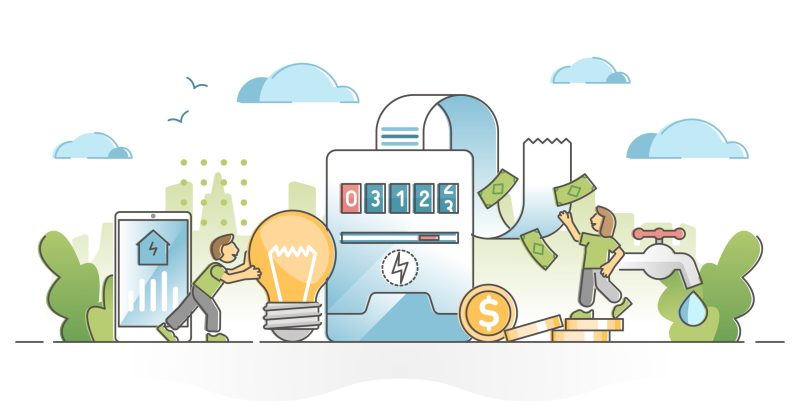Post by Elsemarie Mullins, Project Director at the UNC EFC
The responsibility of water utilities to collect public enterprise fees
As the Low Income Household Water Assistance Program (LIHWAP) was formed less than a year ago, a common billing practice for many utilities jumped to the forefront of the discussion. Water utilities often bill for other public enterprise services (such as wastewater, stormwater, solid water, recycling, and/or electricity). Sometimes, partial payment on a bill must be applied to the other enterprises before the water bill. For example, if Citizen Joe owed $120 dollars in water charges, $150 in wastewater charges, $20 in solid waste fees, and $10 in stormwater fees, and he paid only the amount of the water bill ($120), then he would still need to pay $180 dollars to ensure his water service won’t be disconnected for non-payment. Since in some cases all charges on the bill must be paid to avoid disconnection of water services, the administrators of LIHWAP gave permission for the program to provide payments for other services on the bill to keep customers connected to their vital water/wastewater service if needed. (Though in January 2022 the guidance changed–check with your state LIHWAP contact if you have further questions).
This practice isn’t surprising to people who have spent some time in the utility business in North Carolina (and many other states), but how does it happen and what are the implications of this practice for both customers and utilities?
How are partial payments applied?
The North Carolina general statute giving local government units the authority to fix and enforce rates for enterprise services specifies that each government unit may designate how partial payments are applied (NC GS 160A-314). (There is variety in how other states guide billing practices). It is important to note that customers cannot be disconnected in North Carolina for other fees and taxes that aren’t billed by the public enterprise (see this blog post for more information about that provision). Many municipalities create an ordinance like the one below to specify how payments must be applied, and it is common for water bills to be the last on the list.
“Where stormwater service charges appear on a combined utility bill, and a customer does not pay the service charges for all the utilities on the bill, the partial payment will be applied to the respective service charges in the following order: late fees for the utility bill; delinquent stormwater charges; delinquent sanitation charges; delinquent sewer charges; delinquent water charges; current stormwater charges; current sanitation charges; current sewer charges; and current water charges. As used hereinabove, “charges” includes all fees, charges, and penalties in the fee schedule adopted by city council related to water, sewer, sanitation, stormwater, and any other enterprise systems authorized by G.S. 160A-314.”
What are the implications of partial payment hierarchies?
As mentioned earlier, for customers who are in danger of disconnection due to non-payment of bills, it’s important for assistance agencies to understand the whole bill must be paid to avoid disconnection of water services. When measuring the impact of water/wastewater bills for customers in a community (the affordability of water/wastewater service), the inclusion of other services on the bill affects the total amount due and therefore the total impact of the bill.
For water utilities, it often means a responsibility to 1) bill for the other enterprise services and 2) collect payments and deal with any issues around delinquencies. The ultimate liability for collection rests on the water utility, as it needs to pay for all the other services with the funds it collects before applying payments to water bills. Additionally, the threat of water disconnection is what will compel payment. It makes sense for a local government to create an ordinance to dictate payments in this order, as disconnecting water for a single customer is easier and less impactful for the entire community than disconnecting sewer, not picking up trash or recycling, or not doing stormwater projects because of lack of funds. However, it still costs the water utility time and effort to bill, run a customer service call center, and roll a truck to disconnect a customer. Are water utilities recouping this cost?
In some cases, water utilities do charge other departments for billing customers. However, this depends on the structure of the departments and utility. Water utilities billing for charges outside their jurisdiction will often charge the other government unit for that service. For example, Raleigh Water (a department in the City of Raleigh) bills their customers in Wake Forest for the Town of Wake Forest’s solid waste fees. Raleigh Water then transfers those funds to the Town of Wake Forest and charges the Town of Wake Forest for the service of collecting the solid waste fees. However, it can be harder to calculate when these other fees are part of the same unit of government (i.e. Raleigh Water collecting stormwater fees for the City’s stormwater department). Even if part of the same government unit, it is in each party’s best interest to charge or pay the true cost of billing and collections, so each party has an accurate account of the true cost of running water, stormwater, or another enterprise.
Although it may not be feasible to separate out and recover the entire cost of billing and collecting other public enterprises’ charges for each water utility, it’s important to recognize the key part water utilities play in making sure every other enterprise is funded and to account for the entire bill customers are charged when assessing affordability.
Need technical assistance? The Environmental Finance Center is here to help!
The Environmental Finance Center at UNC-CH offers free one-on-one technical assistance for small water systems. If you have an interest in our support, fill out our interest form here or contact mullins@sog.unc.edu.
Visit https://efc.sog.unc.edu/technical-assistance/ to read more about technical assistance.


